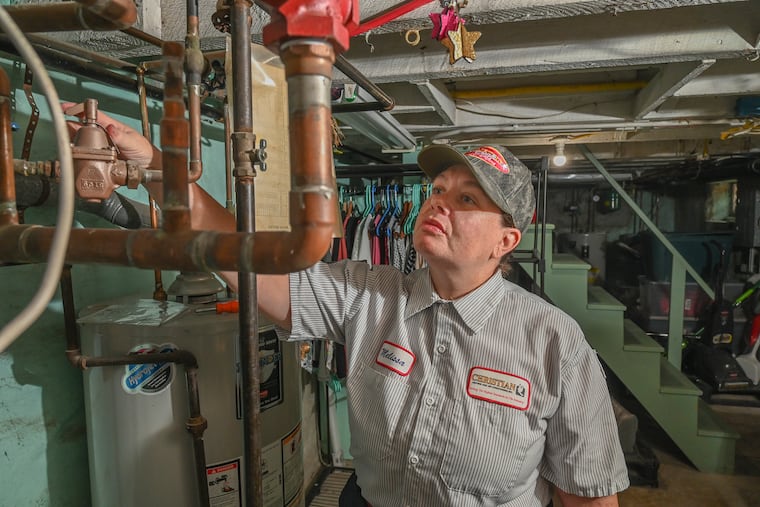Home heating prices are at their highest in years. Here’s how to reduce your heating bill in Philadelphia
Some elements are outside of our control, but there are steps you can take and program to enroll in to reduce your heating bill in the Philly region.

Some Philadelphians are basically paying a second rent with how high heating bills are this winter.
While rising heat costs can be partially blamed on record-setting inflation, it’s a bit more complicated than that, according to recent Inquirer reports. Pandemic-related supply chain and production issues, and the war in Ukraine leading to countries moving away from Russian oil, have all contributed to soaring prices. Additionally, this winter is colder than average with low temperatures in December dropping to 12 degrees.
All of these factors combined lead to some Philadelphia households paying over $400 for their monthly heating bill. While some variables can’t be controlled, there are some steps you can take yourself to lower that electric or gas bill each month. Here’s what we know.
Tips to lower your heating bill
In interviews with Philadelphia Gas Works (PGW) and Philadelphia Electric Company (PECO), representatives shared information that can reduce the amount of energy being used to produce heat in your home, effectively lowering your bill.
Turn down the temperature. PECO estimates that you can decrease your bill by about 2% for every degree you lower that dial. Penn State’s Daniel Ciolkosz recommends “breaking out the sweaters and just kind of having fun with it,” noting that he and his family use electric blankets to keep warm. And make it a habit, if it isn’t already, to turn down the thermostat even more when you leave the house or when sleeping.
Seal and upgrade. Caulk around your doors and windows, and lock windows to cut down on drafts. Upgrade your insulation to reduce air leaks, making you more comfortable and reducing your bills.
Close vents in rooms you aren’t using. Also, shut doors to parts of homes, including closets, that do not need to be heated.
Take advantage of the sun. Open blinds or curtains on south-facing windows to let the light stream in and heat your home naturally. Close them at night to keep valuable warmth inside.
Stay on top of servicing: Get your heating system serviced before winter begins to save money, increase its longevity, and decrease the risk of being exposed to carbon monoxide.
Replace lightbulbs: If you haven’t already, make sure you’re using more efficient LED bulbs.
Invest in a smart thermostat: It connects to your phone and allows you to control your home’s temperature from afar. The device can cost more upfront — from $100 to $300, depending on the type, plus the cost of professional installation — but pays off in your monthly bills. Check with your energy company before purchasing to see if it offers rebates, too, such as PGW’s $70 instant rebate, which was available to all customers this winter regardless of income.
Get a home energy assessment: It can cost $100 to $600 but could save you in the long run. Call your energy provider to get a list of trusted professionals. Peco offers the assessment for $49.
Get financial help to pay for or reduce your heating bill
LIHEAP
This federally-funded program helps low-income households offset the cost of heating and energy-related home repairs through grants that the government pays directly to a utility service provider. These grants range from $300 to $1,000. You can find eligibility requirements online — for a family of four, the household needs to make $41,625 or less.
Apply online at compass.state.pa.us or download a paper application (English or Spanish), print it, fill it out and bring it to your local county assistance office (in Philly, that’s 1163 S. Broad Street, weekdays 8 a.m. to 5 p.m.). Call 1-866-857-7095 for help or contact Philly’s LIHEAP office at 215-560-1583.
Utility service rebates and discounts
Utility service companies, like PECO and PGW, offer rebates and discounts for customers to reduce the cost of their heating bill, get free energy assessments, and get some money back when buying energy-efficient appliances.
Peco: Visit online or call 1-888-573-2672
Philadelphia Gas Works: Visit online or call 1-855-749-7658
PPL Electric Utilities: Visit online or call 1-877-486-9204:
Public Service Electric & Gas: Visit online or call 1-800-436-7734
South Jersey Gas: Visit online or call 1-888-766-9900
Atlantic City Electric: Visit online or call 1-800-642-3780
Energy Coordinating Agency (ECA)
This agency helps low-income Philadelphians save on their heating services and repairs. If income eligible, you can get your heating system repaired for free and be connected to Neighborhood Energy Centers that can assist you with utility service issues. Through these programs, families can save an average of $372 a year in energy costs. Call 215-609-1000 or visit ecasavesenergy.org.
The ECA is Philadelphia county’s state weatherization agency, you can find your county agency online.
New Jersey programs for energy-efficient homes
New Jersey offers energy assistance programs that will help residents offset the costs of utility bills or energy-efficient home repairs and upgrades — like installing energy-saving lightbulbs or heating systems. Call 800-915-8309.
The Philadelphia Inquirer is one of more than 20 news organizations producing Broke in Philly, a collaborative reporting project on solutions to poverty and the city’s push toward economic justice. See all of our reporting at brokeinphilly.org.